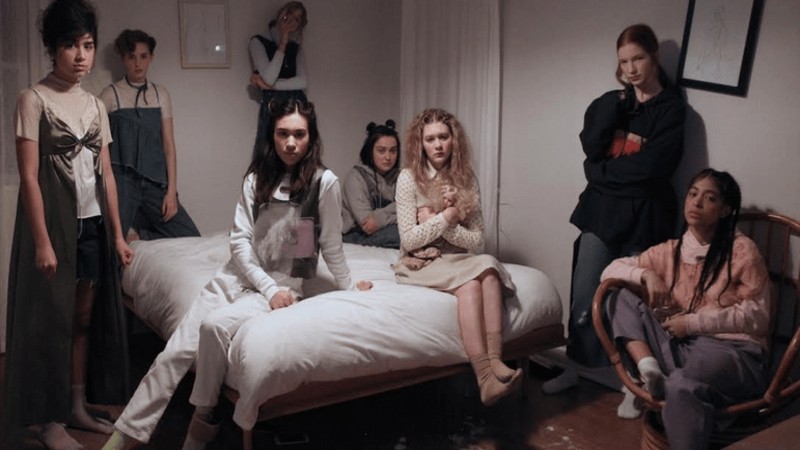QUICK SNAP : LIVE FROM ROTTERDAM
I think I counted three major film references in the first three minutes of Amanda Kramer’s Please Baby Please which opened Rotterdam International Film Festival. There’s a West Side Story gang dances-advances on a couple on a studio bound New York street. They Clockwork Orange (Stanley Kubrick, 1970) a couple to death before the horrified eyes of Arthur and Suze (Harry Melling and Andrea Riseborough), who like Janet and Brad from The Rocky Horror Picture Show (Jim Sharman, 1975), find themselves and their relationship transformed as they open themselves up to the possibilities of transgression. Arthur is particularly struck by Teddy (Karl Glusman), one of the Young Gents – as the gang is called – who dresses like Marlon Brando in The Wild One (László Benedek, 1953). Maybe four references.
Obviously camp is about exactly this. Taking on popular culture, reviving, restyling, parodying, pastiching, subverting and celebrating. It hovers constantly between a smirk and an embrace, over the top jumping for joy and bursting into floods of tears, but always with a slight ironic detachment. Phew. Arthur and Suze are in the process already of transformation. They live in apartment 2B, daring someone to add a Hamlet quote to the address. They hold intellectual discussions about gender identity with their poetry beatnik friends. They weigh up the benefits patriarchy bestows on a man against the horseshit indoctrination you have to go through as a boy. Upstairs lives Maureen, played by a lavishly served Demi Moore: “I ought to be famous, but I’m just married,” as she succinctly puts it. Gifted with household appliances she uses as sex aids, she fantasizes about being choked by her ‘daddy’ and gives Suze another possible identity to slip into.
This is a New York of dive bars and alleyways, streets wet with neon: more Herbert Selby Jr than Don Draper. The music has that grungy riff on 50s style that Angelo Badalamenti gave David Lynch’s weirder neighbourhoods. It’s a place lit by late Rainer Werner Fassbinder and early John Waters. And yet for all that there’s something almost too tasteful and restrained about Kramer’s approach. It’s erotic but not sexy. There’s no grit in the vaseline; no pain to the violence. And going back to Don Draper, there actually is a smoothness to this whole exercise, the distinct whiff of footnotes. You’re waiting for a moment to let rip but it doesn’t really come. Despite its musical feel, there are no real numbers – by far the highlight comes with a sad croon from Cole Escola dressed in drag in a phone booth. Towards the end Melling has a bit of a dance but it doesn’t exactly burst from the screen. Riseborough once again proves a daring and constantly fascinating performer. She’s also credited as an executive producer on the project. She is all energy and danger, gradually turning into a howling prowling gender fluid force of nature – a brundlefly combination of Teddy and Maureen.
Paradoxically for all its palimpsest of allusions Please Baby Please is like nothing being made at the moment and on that alone richly deserves an audience. It looks beautiful, with the production design and costumes specifically deserving mention. One wonders though: will it be the kind of film that a few decades down the line another film like this would be alluding to?
The International Film Festival Rotterdam (IFFR) is an online edition running from 26 January to 6 February.









